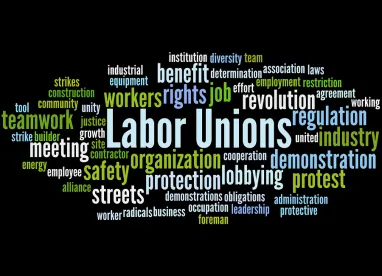As the United States continues to navigate the ongoing coronavirus pandemic and ensuing economic crisis, many employers are considering unprecedented action, such as altering their business model, implementing remote work protocols, or shuttering all or part of their operations. While the challenges arise quickly and often require decisions on a sometimes minute-by-minute basis, unionized employers need to consider that many of the changes they may wish to implement require bargaining with their employees’ union – either “decision” bargaining (meaning bargaining with the labor union before making any decision at all) and/or “effects” bargaining (meaning bargaining after making the decision, but before implementing it).
The National Labor Relations Act imposes a duty to bargain with the union(s) representing an employer’s workforce about changes to “wages, hours and other terms and conditions of employment,” i.e., mandatory subjects of bargaining. Generally, an employer may not modify these terms of employment for union-represented employees absent agreement with the union or an impasse in bargaining. Even if an employer is permitted to make changes unilaterally, under many circumstances, the law requires employers to bargain about the “effects” of those decisions.
In these extraordinary times, when employers’ operations may be affected by external forces outside of their control, the duty to bargain continues. As a result, employers may wish to consider the following:
If the business is subject to a state “stay at home” order for non-essential businesses, does the employer have any discretion to remain operating because it is an essential business and, if so, what classifications of workers can be deemed essential? If the employer is an essential business, should the employer consider closing non-essential operations? If the employer requires its employees to work, should any consideration be given to those who face unique circumstances? Do the labor union representatives have any views on these issues, which may be helpful or adverse to the employer’s goals?
Does the current bargaining agreement address the decision being considered? For example, does it address how workforce reductions take place, the amount of severance or other benefits to be paid on separation, continued health care benefits, or other economic terms? If so, are those provisions consistent with the employer’s current or anticipated financial and business needs?
If the employer’s preferred approach is not consistent with the current labor agreement, would the labor union entertain early “reopener” discussions to modify harmful terms in a manner that benefits workers, for example, by modifying strict seniority layoff or otherwise implementing work-sharing arrangements? What terms can the employer offer in exchange?
When does the current labor agreement expire by its own terms? If the employer intends to renegotiate the contract, all required notices need to be provided in a timely manner. Failure to give timely notice may tie the hands of employers that desperately need to engage in concession bargaining.
Does the labor agreement contain a force majeure clause or language in a management rights clause that allows management broader rights in certain exigent circumstances? Depending on how such a clause is drafted, an employer may be able to invoke it to avoid performing contractual obligations under the employer’s Collective Bargaining Agreement (CBA). The ability to do so will depend on the precise language contained in the agreement, and the parties’ bargaining history.
Does the employer face a compelling economic exigency? Even in the absence of a contractual provision, such as a force majeure clause, exigent circumstances may allow a company to implement changes without bargaining with the union. The National Labor Relations Board has recognized that there may be an exception to the general duty to bargain when “economic exigencies compel prompt action.” Bottom Line Enterprises, 302 NLRB 373 (1991). Whether a given situation fits this exception can be tricky and should be done in consultation with legal counsel. What are the risks faced by an employer if it were to invoke an “inability to pay” claim? Does this prospectively open a company’s books and records to review by the labor union?
While the information contained in this material provides a general overview of the law, each employer will likely face unique business- and employment-related challenges and issues. Therefore, to ensure compliance with the law, employers are encouraged to seek competent legal counsel when responding to inquiries or considering changes to business operations as a result of the coronavirus.



 />i
/>i

